
Dune is a strategy board game set in Frank Herbert's Dune universe, published by Avalon Hill in 1979. The game was designed by Bill Eberle, Jack Kittredge and Peter Olotka. After many years out of print, the game was reissued by Gale Force Nine in 2019 in advance of the 2021 Dune film adaptation.

Pandemic is a cooperative board game designed by Matt Leacock and first published by Z-Man Games in the United States in 2008. Pandemic is based on the premise that four diseases have broken out in the world, each threatening to wipe out a region. The game accommodates two to four players, each playing one of seven possible roles: dispatcher, medic, scientist, researcher, operations expert, contingency planner, or quarantine specialist. Through the combined effort of all the players, the goal is to discover all four cures before any of several game-losing conditions are reached.
The Resistance is a social role-playing card-based social deduction party game. The game's premise involves a war between government and resistance groups, and players are assigned various roles related to these groups. A King Arthur themed-variant with additional roles is marketed as Avalon. Like other social deduction games, The Resistance and Avalon rely on certain players attempting to disrupt the larger group working together, while the rest of the players work to reveal the spy working against them.

7 Wonders is a board game created by Antoine Bauza in 2010 and originally published by Repos Production. Three decks of cards featuring images of historical civilizations, armed conflicts, and commercial activity are used in the card drafting game 7 Wonders. The game received critical success upon its release, and won numerous awards, including the inaugural Kennerspiel des Jahres connoisseurs' award in 2011.
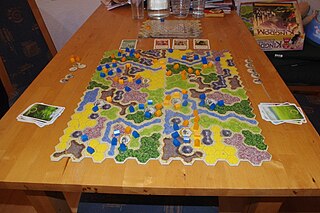
Kingdom Builder is a strategy board game designed by Donald X. Vaccarino, published in 2011 by Queen Games with illustrations by Oliver Schlemmer in German, British and international versions.
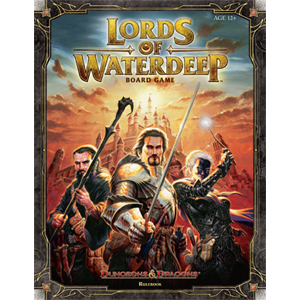
Lords of Waterdeep is a German-style board game designed by Peter Lee and Rodney Thompson and published by Wizards of the Coast in 2012. The game is set in Waterdeep, a fictional city in the Forgotten Realms campaign setting for the Dungeons & Dragons role-playing game. Players take the roles of the masked rulers of Waterdeep, deploying agents and hiring adventurers to complete quests and increase their influence over the city.

Mansions of Madness is a tabletop strategy game designed by Corey Konieczka and published by Fantasy Flight Games in 2011. Players explore a locale filled with Lovecraftian horrors and solve a mystery.

Splendor is a multiplayer card-based board game, designed by Marc André and illustrated by Pascal Quidault. It was published in 2014 by Space Cowboys, Asmodee. Players are gem merchants of the Renaissance, developing gem mines, transportation, and shops to accumulate prestige points. Splendor received positive reviews and received numerous awards, including winner of Golden Geek Best Family Board Game, and nominated for the Spiel des Jahres Game of the Year in 2014. The game also received a mobile application and an expansion released in 2017.

Codenames is a 2015 party card game designed by Vlaada Chvátil and published by Czech Games Edition. Two teams compete by each having a "spymaster" give one-word clues that can point to multiple words on the board. The other players on the team attempt to guess their team's words while avoiding the words of the other team. Codenames received positive reviews and won the 2016 Spiel des Jahres award for the best board game of the year.
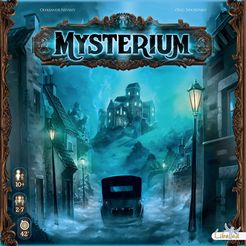
Mysterium is a cooperative board game designed by Oleksandr Nevskiy and Oleg Sidorenko. It blends aspects of murder mystery games and card-based guessing games. One person plays the ghost of a murdered individual who can communicate with the other players only through a series of visions in the form of illustrated cards. The other players, who take the role of psychic mediums, must interpret these cards to identify a suspect, location, and murder weapon. Following its release, Mysterium received positive reviews. It has since received two expansions Mysterium: Hidden Signs and Mysterium: Secrets and Lies, which introduces a new card type to identify: the story.
Mechs vs. Minions is a 2016 cooperative board game published by Riot Games set in the League of Legends universe.
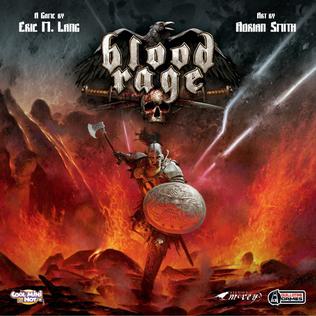
Blood Rage is a Viking themed board game designed by Eric Lang and published by CMON Limited in 2015. Each player controls a clan of mythological Vikings seeking glory as Ragnarok approaches. Played in three ages or rounds, Blood Rage features card drafting, battles and territory control via forces represented by sculpted plastic miniatures. All conflicts are resolved through playing cards, and cards are also used to improve and differentiate the different clans and the leaders, warriors, ships and monsters at their command.

Love Letter is a card game introduced in May 2012 and designed by Seiji Kanai. Its first English-language edition was produced in the United States by Alderac Entertainment Group (AEG) until 2018, when Love Letter was acquired by Z-Man Games.
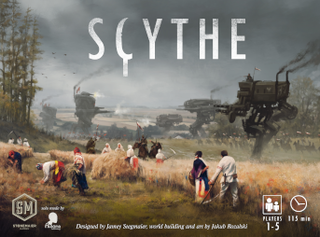
Scythe is a board game for one to five players designed by Jamey Stegmaier and published by Stonemaier Games in 2016. Set in an alternative history version of 1920s Europe, players control factions that produce resources, develop economic infrastructure, and use dieselpunk combat mechs to engage in combat and control territories. Players take up to two actions per turn using individual player boards, and the game proceeds until one player has earned six achievements. At this point, the players receive coins for the achievements they have attained and the territories they control, and the player with the most coins is declared the winner.

Azul is an abstract strategy board game designed by Michael Kiesling and released by Plan B Games in 2017. Based on Portuguese tiles called azulejos, in Azul players collect sets of similarly colored tiles which they place on their player board. When a row is filled, one of the tiles is moved into a square pattern on the right side of the player board, where it garners points depending on where it is placed in relation to other tiles on the board.

Terraforming Mars is a board game for 1 to 5 players designed by Jacob Fryxelius and published by FryxGames in 2016, and thereafter by 12 others, including Stronghold Games. In Terraforming Mars, players take the role of corporations working together to terraform the planet Mars by raising the temperature, adding oxygen to the atmosphere, covering the planet's surface with water and creating plant and animal life. The game incorporates elements of resource management, engine building, and strategic planning. Players compete to earn the most victory points, which are measured by their contribution to terraforming and to human infrastructure. These goals are achieved by collecting income and resources which allow them to play various projects, represented by cards that increase their income or resources, build infrastructure, or directly contribute to terraforming the planet. The game was received positively by fans and critics, and received numerous awards.
Karuba is a tile-laying race game for 2–4 players, designed by Rudiger Dorn and published by HABA in 2015. Each player has 4 explorers, which move through the jungle on the player's private board in order to discover treasure and reach hidden temples. The game was nominated for the 2016 Spiel Des Jahres award.
Glory to Rome is a 2005 card-based board game designed by Ed Carter and Carl Chudyk and published by Cambridge Games. It received positive reviews, but in 2010s it became infamous due to being out of print which led to greatly inflated prices in the secondary market.

Sagrada is a dice-drafting board game designed by Adrian Adamescu and Daryl Andrews and published in 2017 by Floodgate Games. Each player constructs a stained-glass window using dice on a personal 4×5 game board board with restrictions on the types of dice that can be played on each space. Players gain points by completing public and secret objectives for dice placements, and the one with the most after ten rounds is the winner.
Viticulture is a worker placement board game published by Stonemaier Games in 2013. The game's design was crowdfunded via a campaign on Kickstarter, with the concept of players building an Italian vineyard. Upon its release, Viticulture received praise for its engagement, but its luck was critiqued. Several expansions and reprints were later released.















